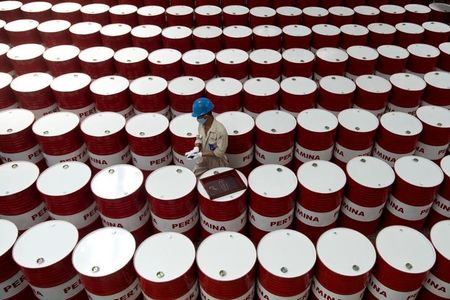Commodities
Low crude oil inventories may support higher 2025 prices

Investing.com — Low crude oil inventories are setting the stage for potential price increases in 2025, according to a recent note from Wells Fargo (NYSE:).
Despite a flat performance this year, the bank said prices could rebound as global supply remains tight and economic conditions improve.
Wells Fargo points out that while crude oil prices have seen minimal change in 2024—just 2% lower since the year began—this has largely been due to “a host of uncertainties on global demand growth and weak economic conditions” that have kept prices under pressure.
However, tight supply conditions mean that crude oil inventories are staying low, which, historically, has supported price increases.
The bank explains, “When global inventories are low or moving lower, oil prices have tended to move higher.” Wells Fargo highlights that this trend of declining inventories is evident in recent months, suggesting that oil prices could soon rise in response.
Looking forward, Wells Fargo projects that an improved macroeconomic environment and increased demand growth in regions such as China could further bolster oil prices.
“Efforts by China to stabilize its property sector could lead to better overall demand growth for commodities and oil,” the note says. As demand picks up globally, Wells Fargo expects crude oil prices to respond accordingly.
For 2025, the bank forecasts West Texas Intermediate (WTI) crude to reach $85–$95 per barrel and to range from $90 to $100 per barrel.
With these expectations, Wells Fargo remains favorable on the Energy sector within commodities, anticipating that low inventories combined with global economic recovery will underpin a positive outlook for crude oil prices in the coming year.
Commodities
Oil prices rise; U.S. crude inventories plunge, Russia-Ukraine truce eyed
Commodities
India’s Reliance to stop buying Venezuelan oil over US tariffs, sources say
Commodities
Oil prices climb on Venezuela supply worries

 Forex4 years ago
Forex4 years agoForex Today: the dollar is gaining strength amid gloomy sentiment at the start of the Fed’s week

 Forex3 years ago
Forex3 years agoUnbiased review of Pocket Option broker

 Forex3 years ago
Forex3 years agoDollar to pound sterling exchange rate today: Pound plummeted to its lowest since 1985

 Forex4 years ago
Forex4 years agoHow is the Australian dollar doing today?

 Cryptocurrency4 years ago
Cryptocurrency4 years agoWhat happened in the crypto market – current events today

 World3 years ago
World3 years agoWhy are modern video games an art form?

 Commodities4 years ago
Commodities4 years agoCopper continues to fall in price on expectations of lower demand in China

 Economy3 years ago
Economy3 years agoCrude oil tankers double in price due to EU anti-Russian sanctions





























